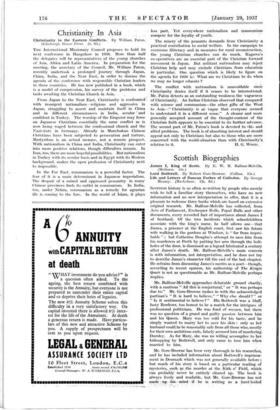Chritiaiiity In Asia.
THE International Missionary Council proposes to hold its next conference in Hangchow in 1938. More than half the delegates will be representatives of the young churches of Asia, Africa and Latin America. In preparation for the meeting, the secretary_ of the Council, Mr. William Paton, recently undertook a prolonged journey through Japan, China, India, and the Near East, in order to discuss the agenda of the conference with responsible Christian leaders in those countries. He has now published in a book, which is a model of compression, his survey of the problems and tasks awaiting the Christian Church in Asia.
From Japan to the Near East, Christianity is confronted:- with resurgent nationalism—religious and aggressive in Japan, struggling to assert and maintain itself in China and in different circumstances in India, - secular and confident in Turkey. The worship of the Emperoi may force on Japanese Christians essentially the same conflict as is now being waged between the confessional church and the Nazi-state in Germany. Already in Manchukuo Chinese Christians have been subjected to persecution and torture. Martyrdom is an actual menace, not a remote prospect. With nationalism in China and India, Christianity can enter into more positive relations, though difficulties remain. In Iran, too, there are more hopeful possibilities. But nationalism in Turkey with its secular basis and in Egypt with its Moslem background, makes the open profession of Christianity next to impossible.
In the Far East, communism is a powerful factor. The fear of it is a main determinant in Japanese imperialism. The despair of a ruined and oppressed peasantry in many Chinese provinces finds its outlet in communism. In India, too, under Nehru, communism as a remedy for agrarian ills is coming to the fore. In the world of Islam, it plays
less part., Yet everywhere nationalism and communism eoMpete for the loyalty -Of yOuth; • The misery of the peasants demands from Christianity a practical contribution to social welfare. In the campaign to overcome illiteracy and in measures for rural reconstruction; the young Christian churches can do much. Kagawa's co-operatives are an essential part of the Christian forward movement in Japan. But militant nationalism may reject Christian help and may exclude Christians from education in particular.' One question which is likely to figure on the agenda for 1938 is : What are we Christians to do when we may no longer educate ?
The conflict with nationalism is unavoidable since Christianity denies itselfif it ceases to be international. Mr. Paton detects as an outstanding weakness the vagueness of Christianity. An Indian Christian observed that compareil with science and communism—the other gifts of the West to Asia—" Christianity is so vague that everyone seemed to understand it in a different sense." A clearer and more generally accepted account of the thought-content of the Christian faith appears to be essential to its further advance. The second part of Mr. Paton's book is devoted to 1 hi ; and allied problenis. The book is of absorbing interest and should appeal not only to Christians but also to those who are more concerned with the world-situation than with Christianity's






















































 Previous page
Previous page